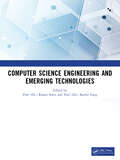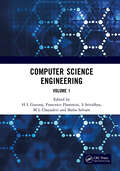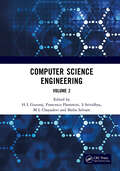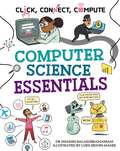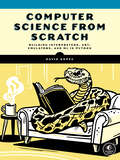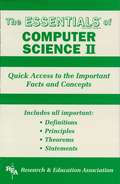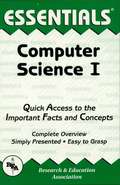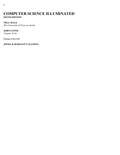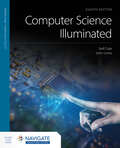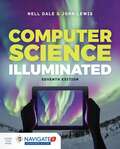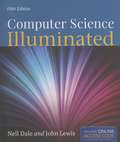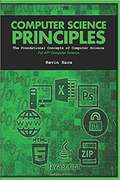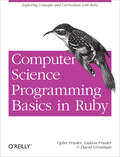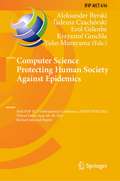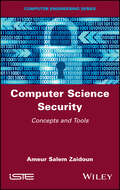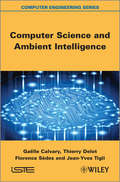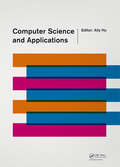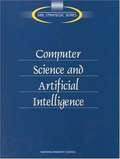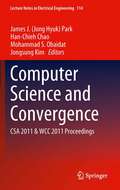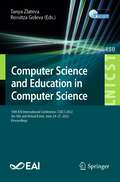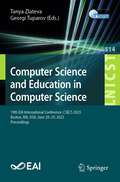- Table View
- List View
Computer Science Engineering and Emerging Technologies: Proceedings of ICCS 2022
by Rajeev Sobti Rachit Garg Ajeet Kumar Srivastava Gurpreet Singh ShahiThe year 2022 marks the 100th birth anniversary of Kathleen Hylda Valerie Booth, who wrote the first assembly languageand designed the assembler and auto code for the first computer systems at Birkbeck College, University of London.She helped design three different machines including the ARC (Automatic Relay Calculator), SEC (Simple ElectronicComputer), and APE(X). School of Computer Science and Engineering, under the aegis of Lovely Professional University,pays homage to this great programmer of all times by hosting “BOOTH100”—6th International Conference on ComputingSciences.
Computer Science Engineering: Proceedings of the 1st International Conference on Computing and Intelligent Information Systems (ICCIIS 2024), Bangalore, India, 19-20th April, 2024 Volume 1
by Francesco Flammini H. L. Gururaj S. Srividhya M. L. Chayadevi Sheba SelvamThis book provides a comprehensive overview of the latest advancements and research in the fields of computing and intelligent information systems. It compiles cutting-edge studies, innovative methodologies, and practical applications presented at the conference ICCIIS 2024.The book delves into several core areas of modern computing and intelligent information systems. Key topics include artificial intelligence, exploring machine learning algorithms and neural networks; information systems and robotic process automation, highlighting efficient business process automation strategies; and signal, image, and video processing, focusing on innovative techniques for multimedia analysis. Big data analytics is also covered with insights into data mining and predictive analytics. Cloud computing and cybersecurity are explored, emphasizing secure, scalable solutions for data storage and protection. The Internet of Things (IoT) is examined for its impact on interconnected devices and smart systems. Additionally, the book explores advanced computing and intelligent networks, addressing the development of high-performance computing systems and sophisticated network architectures.This book is intended for academics, researchers, and professionals in the fields of computing and information systems, as well as students pursuing advanced studies in these areas. It is also a valuable resource for industry practitioners seeking to stay abreast of the latest trends and innovations in AI, big data, and cybersecurity.
Computer Science Engineering: Proceedings of the 1st International Conference on Computing and Intelligent Information Systems (ICCIIS 2024), Bangalore, India, 19-20th April, 2024 Volume 2
by Francesco Flammini H. L. Gururaj S. Srividhya M. L. Chayadevi Sheba SelvamThis book provides a comprehensive overview of the latest advancements and research in the fields of computing and intelligent information systems. It compiles cutting-edge studies, innovative methodologies, and practical applications presented at the conference ICCIIS 2024.The book delves into several core areas of modern computing and intelligent information systems. Key topics include artificial intelligence, exploring machine learning algorithms and neural networks; information systems and robotic process automation, highlighting efficient business process automation strategies; and signal, image, and video processing, focusing on innovative techniques for multimedia analysis. Big data analytics is also covered with insights into data mining and predictive analytics. Cloud computing and cybersecurity are explored, emphasizing secure, scalable solutions for data storage and protection. The Internet of Things (IoT) is examined for its impact on interconnected devices and smart systems. Additionally, the book explores advanced computing and intelligent networks, addressing the development of high-performance computing systems and sophisticated network architectures.This book is intended for academics, researchers, and professionals in the fields of computing and information systems, as well as students pursuing advanced studies in these areas. It is also a valuable resource for industry practitioners seeking to stay abreast of the latest trends and innovations in AI, big data, and cybersecurity.
Computer Science Essentials (Click, Connect, Compute #1)
by Dharini BalasubramaniamComputer science fundamentals, using clear, expert explanations and comic illustrations to spark interest and enthusiasm in the next generation of computer scientists!Computer Science Essentials looks at the key pillars of this fascinating discipline: from its role in communication and education, to healthcare and entertainment. Readers will get to grips with the hardware, software and pioneers of computer science who have driven new ideas and changed the world. And the end of the book fast-forwards to the future of computer science, robotics and considers what it might mean to live in a 'smarter' world.Contents: What is computer science? / Computer science and our world / Must-have parts / The key players in computer science / Important ideas at play / The fascinating fundamentals / Spotting computer science in the wild / It's more than just tech / Opening up a variety of careers / The future of computer science / Pioneer portraits / Further information / Glossary / Quiz yourself! / IndexThe Click, Connect, Compute series untangles the computer science web and teaches children about the essentials of computer software, hardware and digital literacy as well as discussing the ethics surrounding this evolving field. Featuring fun, friendly comic strip illustrations, pioneer bios and a quiz, this is a perfect read for children aged 8+. Books in the series: Computer Science Essentials / Data, Big and Small / Smart Machines / The Languages of ProgrammingWritten in a clear, thoughtful way by computer science expert, Dr. Dharini Balasubramaniam, a strong advocate for ethics and education in her field.
Computer Science From Scratch: Building Interpreters, Art, Emulators and ML in Python
by David KopecYou know how to write Python. Now master the computer science that makes it work.If you&’ve been programming for a while, you may have found yourself wondering about the deeper principles behind the code. How are programming languages implemented? What does an interpreter really do? How does the microprocessor execute instructions at a fundamental level? How does a machine learning algorithm make decisions?Computer Science from Scratch is for experienced Python programmers who want to fill in those gaps—not through abstract lectures, but through carefully designed projects that bring core CS concepts to life. Understanding these fundamental building blocks will make you a more versatile and effective programmer.Each chapter presents a focused, hands-on project that teaches a fundamental idea in computer science:INTERPRETERS: Understand syntax, parsing, and evaluation by writing a BASIC interpreterEMULATORS: Learn computer architecture by building an NES emulator from the ground upGRAPHICS: Explore image manipulation and algorithmic art through computer graphics projectsMACHINE LEARNING: Demystify classification by implementing a simple, readable KNN modelThese projects aren&’t about building tools—they&’re structured lessons that use code to reveal how computing works. Each chapter concludes with real-world context, thoughtful extensions, and exercises to deepen your understanding.Authored by David Kopec, a computer science professor and author of the popular Classic Computer Science Problems series, this is not a beginner&’s book, and it&’s not a theory-heavy academic text. It&’s a practical, code-driven introduction to the essential ideas and mechanisms of computer science—written for programmers who want more than syntax.If you&’ve been writing Python and are ready to explore the foundations behind computing, this book will guide you there—with clarity, depth, and purpose.
Computer Science I Essentials
by Randall RausREA's Essentials provide quick and easy access to critical information in a variety of different fields, ranging from the most basic to the most advanced. As its name implies, these concise, comprehensive study guides summarize the essentials of the field covered. Essentials are helpful when preparing for exams, doing homework and will remain a lasting reference source for students, teachers, and professionals. Computer Science I includes fundamental computer concepts, number representations, Boolean algebra, switching circuits, and computer architecture.
Computer Science I Essentials
by Randall RausREA’s Essentials provide quick and easy access to critical information in a variety of different fields, ranging from the most basic to the most advanced. As its name implies, these concise, comprehensive study guides summarize the essentials of the field covered. Essentials are helpful when preparing for exams, doing homework and will remain a lasting reference source for students, teachers, and professionals. Computer Science I includes fundamental computer concepts, number representations, Boolean algebra, switching circuits, and computer architecture.
Computer Science Illuminated
by John Lewis Nell DaleFully revised and updated, the Sixth Edition of the best selling text Computer Science Illuminated retains the accessibility and in depth coverage of previous editions, while incorporating all new material on cutting edge issues in computer science. Authored by the award winning Nell Dale and John Lewis, Computer Science Illuminate d's unique and innovative layered approach moves through the levels of computing from an organized, language neutral perspective.
Computer Science Illuminated
by John Lewis Nell DaleDesigned for the introductory computing and computer science course, the student-friendly Computer Science Illuminated, Eighth Edition provides students with a solid foundation for further study, and offers non-majors a complete introduction to computing. Fully revised and updated, the eighth edition of this best-selling text retains the accessibility and in-depth coverage of previous editions, while incorporating all-new material on cutting-edge issues in computer science. Authored by the award-winning team Nell Dale and John Lewis, the text provides a unique and innovative layered approach, moving through the levels of computing from an organized, language-neutral perspective.
Computer Science Illuminated
by John Lewis Nell DaleDesigned for the introductory computing and computer science course, the student-friendly Computer Science Illuminated, Seventh Edition provides students with a solid foundation for further study, and offers non-majors a complete introduction to computing. Fully revised and updated, the Seventh Edition of this best-selling text retains the accessibility and in-depth coverage of previous editions, while incorporating all-new material on cutting-edge issues in computer science. Authored by the award-winning team Nell Dale and John Lewis, the text provides a unique and innovative layered approach, moving through the levels of computing from an organized, language-neutral perspective.
Computer Science Illuminated (Fifth Edition)
by John Lewis Nell DaleRevised and updated with the latest information in the field, the Fifth Edition of best-selling Computer Science Illuminated continues to provide students with an engaging breadth-first overview of computer science principles and provides a solid foundation for those continuing their study in this dynamic and exciting discipline. Authored by two of today's most respected computer science educators, Nell Dale and John Lewis, the text carefully unfolds the many layers of computing from a language-neutral perspective, beginning with the information layer, progressing through the hardware, programming, operating systems, application, and communication layers, and ending with a discussion on the limitations of computing. Separate program language chapters are available as bundle items for instructors who would like to explore a particular programming language with their students. Ideal for introductory computing and computer science courses, the fifth edition's thorough presentation of computing systems provides computer science majors with a solid foundation for further study, and offers non-majors a comprehensive and complete introduction to computing. New Features of the Fifth Edition:- A new chapter on computer security provides readers with the latest information on preventing unauthorized access; types of malware and anti-virus software; protecting online information, including data collection issues with Facebook, Google, etc. ; security issues with mobile and portable devices; and more. - A NEW section on cloud computing offers readers an overview of the latest way in which businesses and users interact with computers and mobile devices. - The section on social networks has been rewritten to include up-to-date information, including new data on Google+ and Facebook. - The sections covering HTML have been updated to include HTML5. - Revised and updated Did You Know callouts are included in the chapter margins. - The updated Ethical Issues at the end of each chapter have been revised to tie the content to the tenth strand recommended by the ACM, which stresses the importance of computer ethics. Accompanied by a comprehensive suite of instructor resources including answers to the end of chapter exercises, answers to the optional lab exercises, PowerPoint Lecture Outlines, Image Bank, and a complete Test Bank. Every new copy is packaged with full student access code to the robust Companion Website featuring:Animated Flashcards; Relevant Web Links; Crossword Puzzles; Interactive Glossary; Digital Lab Manual; R. Mark Meyer's labs, Explorations in Computer Science; Additional programming chapters, including Alice, C++, Java, JavaScript, Pascal, Perl, Python, Ruby, SQL, and VB. NET; C++ Language Essentials labs; Java Language Essentials labs; Link to Download Pep/8
Computer Science Principles: The Foundational Concepts of Computer Science for AP Computer Science
by Kevin HareFor AP #65533; Computer Science Principles: Computer Science is the fastest growing field in the World and there are no signs of slowing. Just because this is a relatively new field of study, it should not be scary to learn or thought to be too difficult to understand. Anyone who has ever turned on a phone or surfed the Internet should have a basic understanding of what happens when the mouse is clicked or the screen is touched (and how fast it happens!). How does a simple process convert to 1's and 0's and travel thousands of miles in a blink of the eye? What is an IP address? What do IP/TCP, DNS, HTML, and CSS stand for? How do large movies and thousands of songs all fit onto a hard drive? How can secrets be sent in plain sight? These questions are answered in Computer Science Principles: The Foundational Concepts of Computer Science, plus spreadsheets, photo-editing, web-design (HTML and CSS), learning to code with JavaScript, and more!
Computer Science Programming Basics in Ruby: Exploring Concepts and Curriculum with Ruby
by David Grossman Gideon Frieder Ophir FriederIf you know basic high-school math, you can quickly learn and apply the core concepts of computer science with this concise, hands-on book. Led by a team of experts, you’ll quickly understand the difference between computer science and computer programming, and you’ll learn how algorithms help you solve computing problems.Each chapter builds on material introduced earlier in the book, so you can master one core building block before moving on to the next. You’ll explore fundamental topics such as loops, arrays, objects, and classes, using the easy-to-learn Ruby programming language. Then you’ll put everything together in the last chapter by programming a simple game of tic-tac-toe.Learn how to write algorithms to solve real-world problemsUnderstand the basics of computer architectureExamine the basic tools of a programming languageExplore sequential, conditional, and loop programming structuresUnderstand how the array data structure organizes storageUse searching techniques and comparison-based sorting algorithmsLearn about objects, including how to build your ownDiscover how objects can be created from other objectsManipulate files and use their data in your software
Computer Science Protecting Human Society Against Epidemics: First IFIP TC 5 International Conference, ANTICOVID 2021, Virtual Event, June 28–29, 2021, Revised Selected Papers (IFIP Advances in Information and Communication Technology #616)
by Erol Gelenbe Yuko Murayama Tadeusz Czachórski Krzysztof Grochla Aleksander ByrskiThis book constitutes the refereed post-conference proceedings of the First IFIP TC 5 International Conference on Computer Science Protecting Human Society Against Epidemics, ANTICOVID 2021, held virtually in June 2021.The 7 full and 4 short papers presented were carefully reviewed and selected from 20 submissions. The papers are concerned with a very large spectrum of problems, ranging from linguistics for automatic translation of medical terms, to a proposition for a worldwide system of fast reaction to emerging pandemic.
Computer Science Security: Concepts and Tools
by Ameur Salem ZaidounThis book serves as a guide to help the reader develop an awareness of security vulnerabilities and attacks, and encourages them to be circumspect when using the various computer resources and tools available today. For experienced users, Computer Science Security presents a wide range of tools to secure legacy software and hardware.Computing has infiltrated all fields nowadays. No one can escape this wave and be immune to security attacks, which continue to evolve, gradually reducing the level of expertise needed by hackers.It is high time for each and every user to acquire basic knowledge of computer security, which would enable them to mitigate the threats they may face both personally and professionally. It is this combined expertise of individuals and organizations that will guarantee a minimum level of security for families, schools, the workplace and society in general.
Computer Science Volume - 1 Concepts 11th Standard - Tamilnadu Board
by Training State Council of Educational ResearchComputer Science Textbook Volume - 1 Concepts for the 11th Standard Students, preparing for Tamil Nadu State Board Exam.
Computer Science Volume - 1 Tools 12th Standard - Tamilnadu Board
by Training State Council of Educational ResearchComputer Science Textbook Volume - 1 Tools, for the 12th Standard Students, preparing for Tamil Nadu State Board Exam.
Computer Science Volume - 2 Object Technology 12th Standard - Tamilnadu Board
by Training State Council of Educational ResearchComputer Science Textbook Volume - 2 Object Technology, for the 12th Standard Students, preparing for Tamil Nadu State Board Exam.
Computer Science Volume - II Practice 11th Standard - Tamilnadu Board
by Training State Council of Educational ResearchComputer Science Textbook Volume - II Practice for the 11th Standard Students, preparing for Tamil Nadu State Board Exam.
Computer Science and Ambient Intelligence (Wiley-iste Ser.)
by Thierry Delot Gaëlle Calvary Jean-Yves Tigli Florence SedesThis book focuses on ambient intelligence and addresses various issues related to data management, networking and HCI in this context. Taking a holistic view, it covers various levels of abstraction, ranging from fundamental to advanced concepts and brings together the contributions of various specialists in the field.Moreover, the book covers the key areas of computer science concerned with the emergence of ambient intelligence (e.g. interaction, middleware, networks, information systems, etc.). It even goes slightly beyond the borders of computer science with contributions related to smart materials and ethics. The authors cover a broad spectrum, with some chapters dedicated to the presentation of basic concepts and others focusing on emerging applications in various fields such as health, transport and tourism.
Computer Science and Applications: Proceedings of the 2014 Asia-Pacific Conference on Computer Science and Applications (CSAC 2014), Shanghai, China, 27-28 December 2014
by Ally HuThe 2014 Asia-Pacific Conference on Computer Science and Applications was held in Shanghai, December 27-28, 2014. These CSAC-2014 proceedings include 105 selected papers, which focus not only on the research of science and technology of computer sciences, but also on the research of applications, aiming at a quick and immediate effect on
Computer Science and Artificial Intelligence
by Panel on Computer Science Artificial IntelligenceThe National Academies Press (NAP)--publisher for the National Academies--publishes more than 200 books a year offering the most authoritative views, definitive information, and groundbreaking recommendations on a wide range of topics in science, engineering, and health. Our books are unique in that they are authored by the nation's leading experts in every scientific field.
Computer Science and Convergence: CSA 2011 & WCC 2011 Proceedings (Lecture Notes in Electrical Engineering #114)
by Mohammad S. Obaidat Jongsung Kim Han-Chieh Chao James Jong ParkComputer Science and Convergence is proceedings of the 3rd FTRA International Conference on Computer Science and its Applications (CSA-11) and The 2011 FTRA World Convergence Conference (FTRA WCC 2011). The topics of CSA and WCC cover the current hot topics satisfying the world-wide ever-changing needs. CSA-11 will be the most comprehensive conference focused on the various aspects of advances in computer science and its applications and will provide an opportunity for academic and industry professionals to discuss the latest issues and progress in the area of CSA. In addition, the conference will publish high quality papers which are closely related to the various theories and practical applications in CSA. Furthermore, we expect that the conference and its publications will be a trigger for further related research and technology improvements in this important subject. The main scope of CSA-11 is as follows: - Mobile and ubiquitous computing - Dependable, reliable and autonomic computing - Security and trust management - Multimedia systems and services - Networking and communications - Database and data mining - Game and software engineering - Grid, cloud and scalable computing - Embedded system and software - Artificial intelligence - Distributed and parallel algorithms - Web and internet computing - IT policy and business management WCC-11 is a major conference for scientists, engineers, and practitioners throughout the world to present the latest research, results, ideas, developments and applications in all areas of convergence technologies. The main scope of WCC-11 is as follows: - Cryptography and Security for Converged environments - Wireless sensor network for Converged environments - Multimedia for Converged environments - Advanced Vehicular Communications Technology for Converged environments - Human centric computing, P2P, Grid and Cloud computing for Converged environments - U-Healthcare for Converged environments - Strategic Security Management for Industrial Technology - Advances in Artificial Intelligence and Surveillance Systems
Computer Science and Education in Computer Science: 18th EAI International Conference, CSECS 2022, On-Site and Virtual Event, June 24-27, 2022, Proceedings (Lecture Notes of the Institute for Computer Sciences, Social Informatics and Telecommunications Engineering #450)
by Rossitza Goleva Tanya ZlatevaThis book constitutes the refereed post-conference proceedings of the 18th EAI International Conference on Computer Science and Education in Computer Science, CSECS 2022, held in June 2022 in Sofia, Bulgaria. Due to COVID-19 pandemic the conference was held On-Site and virtually.The 15 full papers and 9 short papers were carefully reviewed and selected from 53 submissions. The papers present are grouped into 2 tracks, i.e., computer science implementations and education in computer science. CSECS conference presents research in software engineering and information systems design, cryptography, the theoretical foundation of the algorithms, and implementation of machine learning and big data technologies. Another important topic of the conference is the education in computer science which includes the introduction and evaluation of computing programs, curricula, and online courses, to syllabus, laboratories, teaching, and pedagogy aspects. The technical and education topics evolved multiple existing and emerging technologies, solutions, and services for design and training providing a heterogeneous approach towards delivering Software 4.0 and Education 4.0 to a broad range of citizens and societies.
Computer Science and Education in Computer Science: 19th EAI International Conference, CSECS 2023, Boston, MA, USA, June 28–29, 2023, Proceedings (Lecture Notes of the Institute for Computer Sciences, Social Informatics and Telecommunications Engineering #514)
by Tanya Zlateva Georgi TuparovThis book constitutes the refereed post-conference proceedings of the 19th International Conference on Computer Science and Education in Computer Science, CSECS 2023, held in June 2023 in Boston, MA, USA.The 23 full papers and 9 short papers were carefully reviewed and selected from 88 submissions. The papers cover many systems technologies, applications, and services as well as solutions. Multiple topics have been addressed including the theory of computation, models of computation, computational complexity and cryptography, logic, design, and analysis of algorithms, network architectures, performance evaluation, network services, software engineering, software creation, and management, applied computing, machine learning, and education.
